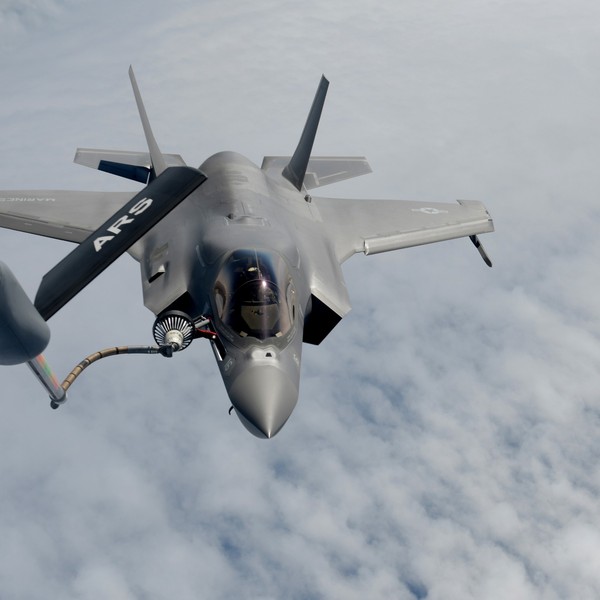Earlier this month, the House and Senate Armed Services Committees named eight commissioners who will review President Joe Biden’s National Defense Strategy and provide recommendations for its implementation.
But the Commission on the National Defense Strategy, which is tasked with “examin[ing] the assumptions, objectives, defense investments, force posture and structure, operational concepts, and military risks of the NDS,” according to the Armed Services Committees, is largely comprised of individuals with financial ties to the weapons industry and U.S. government contractors, raising questions about whether the commission will take a critical eye to contractors who receive $400 billion of the $858 billion FY2023 defense budget.
The potential conflicts of interest start at the very top of the eight-person commission. The chair of the commission, former Rep. Jane Harman (D-Calif.), sits on the board of Iridium Communications, a satellite communications firm that was awarded a seven-year $738.5 million contract with the Department of Defense in 2019.
“Iridium and its Board members follow Iridium’s Code of Business Conduct and Ethics and all rules and regulations applicable to dealings with the U.S. government,” Iridium spokesman Jordan Hassin told Responsible Statecraft.
A January 11 press release announcing the commission’s roster cited Harman’s current board memberships at the Department of Homeland Security and NASA but made no mention of her Iridium board membership, which paid her $180,000 in total compensation in 2021. Harman held 50,352 shares in Iridium, now worth approximately $3 million, in March 2022, according to the company’s disclosures.
“The members of the Commission on the National Defense Strategy each hold long records of ethical public service and national security leadership,” a Senate Armed Services Committee spokesperson told Responsible Statecraft. “The commissioners have committed to adhering to all government ethics policies to prevent any potential conflicts of interest. Congress will provide responsible oversight throughout the Commission’s work.”
That oversight will be complicated, judging by the financial ties to government and defense contractors held by six of the eight commission members.
“Lets face it, the National Defense Strategy and the Commission on the National Defense Strategy are flipsides of the same coin,” Mark Thompson, national security analyst at the Project on Government Oversight, told Responsible Statecraft. “Both are heavily infected by Pentagon spending and Pentagon contractors."
“These folks have a vested interest in spending more,” said Thompson. “In Washington's national security community, the way you get credibility is to work at think tanks funded by defense contractors or serving on boards of defense contractors.”
Indeed, Thompson’s characterization of who has “credibility” appears to be reflected in appointments to the Commission.
Commission member John “Jack” Keane serves on the board of IronNet, a firm that describes itself as providing “Collective Defense powered with network detection and response (NDR), we empower national security agencies to gain better visibility into the threat landscape across the private sector with anonymized data, while benefiting from the insight and vigilance of a private/public community of peers.” The firm’s 2022 second quarter report made clear that IronNet is dependent on government contracts.
“Our business depends, in part, on sales to government organizations, and significant changes in the contracting or fiscal policies of such government organizations could have an adverse effect on our business and results of operations,” the report said.
Keane received $210,751 in total compensation from IronNet in their fiscal year ending January 31, 2022.
Ties to contractors extend beyond the commission members who serve on corporate boards.
Another commission member, Thomas Mahnken, serves as president and CEO of the Center for Strategic and Budgetary Assessment, a job that paid him $394,924 in 2019, the last year in which financial disclosures are available. Major weapons firms, and some of the government’s biggest contractors, are listed as funders of the Center, including Aerojet Rocketdyne, BAE Systems, General Atomics, General Dynamics, L3 Technologies, Lockheed Martin, Northrop Grumman, Raytheon, and Boeing.
Similarly, commission member Roger Zakheim serves as Washington Director of the Ronald Reagan Presidential Foundation and Institute, a job that earned him $495,500 in 2020, the last year for which financial disclosures are available. Major defense contractors play an outsized role in funding the Foundation, including: Boeing, General Dynamics, BAE Systems, Anduril, L3Harris, Lockheed Martin, Northrop Grumman, Palantir, Raytheon, Leonardo DRS, Sierra Nevada Corporation and Thales.
Finally, employees of two major tech companies with government contracts were appointed to the commission: Alissa Starzak, Vice President and Global Head of Policy at Cloudflare and Mariah Sixkiller, General Manager of Strategic Defense at Microsoft.
Last year, Cloudflare told investors, “Our business depends, in part, on sales to the United States and foreign government organizations which are subject to a number of challenges and risks.”
When reached for comment, a Cloudflare spokesperson told Responsible Statecraft, “Alissa Starzak is one of the country's leading experts at the intersection of national security and cyber security."
“Cloudflare is proud of the contributions that she is making to the Commission. All Cloudflare internal policies and all government ethics policies have been satisfied to prevent any potential conflict of interest,” said the spokesperson.
Microsoft, for its part, is the recipient of billions of dollars in cloud computing contracts from the Department of Defense. The company declined to comment on Sixkiller’s appointment.
The appointment to the commission of individuals with deep ties to the contracting and weapons sectors is also consistent with campaign contributions to the chairs of both the House and Senate Armed Services Committees.
SASC chairman Sen. Jack Reed (D-R.H.) counts General Dynamics employees as the top source of campaign contributions over his entire political career, and HASC chairman Rep. Mike D. Rogers (R-Ala.) saw Lockeed Martin employees as his top source of campaign funds in the past election cycle.
As the defense budget creeps toward $1 trillion, voices who will bring a critical eye to the NDS, and the enormous costs associated with the strategy, are unlikely to be found within the newly appointed commission.
“The nation's security is an important responsibility, but the subordinate question is whether we're doing it in the best way possible,” said Thompson. “It seems that the NDS commission is going to give us more of the same.”
IronNet, the Center for Strategic and Budgetary Assessment, and the Reagan Foundation did not respond to requests for comment.















